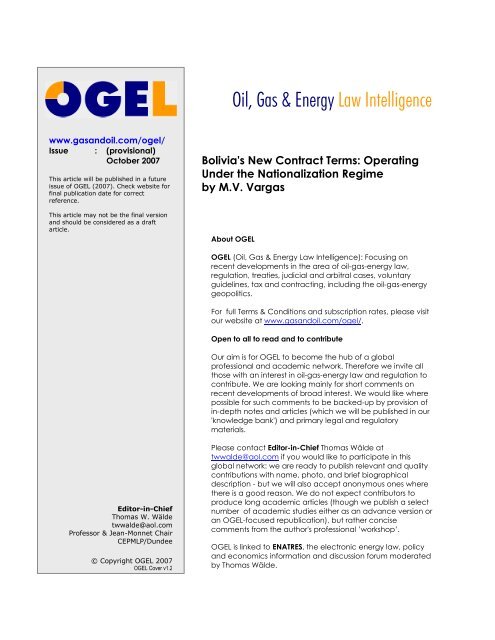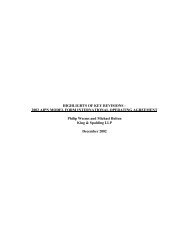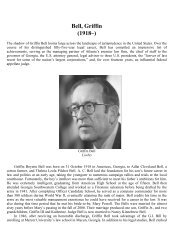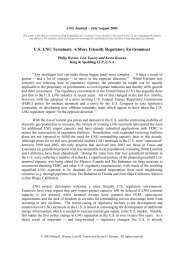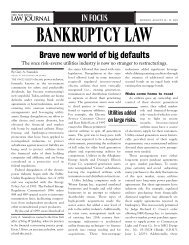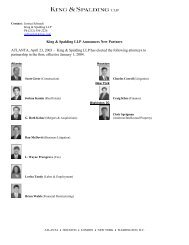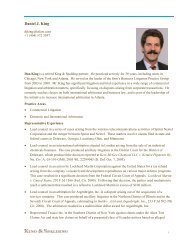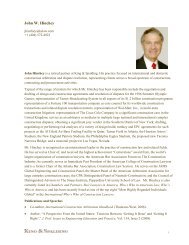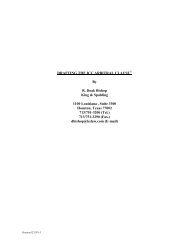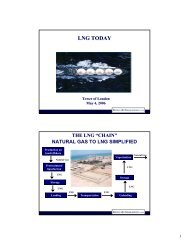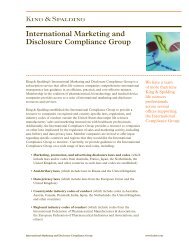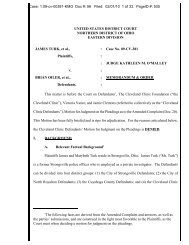Bolivia's New Contract Terms: Operating. Under ... - King & Spalding
Bolivia's New Contract Terms: Operating. Under ... - King & Spalding
Bolivia's New Contract Terms: Operating. Under ... - King & Spalding
You also want an ePaper? Increase the reach of your titles
YUMPU automatically turns print PDFs into web optimized ePapers that Google loves.
Oil, Gas & Energy Law Intelligence<br />
www.gasandoil.com/ogel/<br />
Issue : (provisional)<br />
October 2007<br />
This article will be published in a future<br />
issue of OGEL (2007). Check website for<br />
final publication date for correct<br />
reference.<br />
This article may not be the final version<br />
and should be considered as a draft<br />
article.<br />
<strong>Bolivia's</strong> <strong>New</strong> <strong>Contract</strong> <strong>Terms</strong>: <strong>Operating</strong><br />
<strong>Under</strong> the Nationalization Regime<br />
by M.V. Vargas<br />
About OGEL<br />
OGEL (Oil, Gas & Energy Law Intelligence): Focusing on<br />
recent developments in the area of oil-gas-energy law,<br />
regulation, treaties, judicial and arbitral cases, voluntary<br />
guidelines, tax and contracting, including the oil-gas-energy<br />
geopolitics.<br />
For full <strong>Terms</strong> & Conditions and subscription rates, please visit<br />
our website at www.gasandoil.com/ogel/.<br />
Open to all to read and to contribute<br />
Our aim is for OGEL to become the hub of a global<br />
professional and academic network. Therefore we invite all<br />
those with an interest in oil-gas-energy law and regulation to<br />
contribute. We are looking mainly for short comments on<br />
recent developments of broad interest. We would like where<br />
possible for such comments to be backed-up by provision of<br />
in-depth notes and articles (which we will be published in our<br />
'knowledge bank') and primary legal and regulatory<br />
materials.<br />
Editor-in-Chief<br />
Thomas W. Wälde<br />
twwalde@aol.com<br />
Professor & Jean-Monnet Chair<br />
CEPMLP/Dundee<br />
© Copyright OGEL 2007<br />
OGEL Cover v1.2<br />
Please contact Editor-in-Chief Thomas Wälde at<br />
twwalde@aol.com if you would like to participate in this<br />
global network: we are ready to publish relevant and quality<br />
contributions with name, photo, and brief biographical<br />
description - but we will also accept anonymous ones where<br />
there is a good reason. We do not expect contributors to<br />
produce long academic articles (though we publish a select<br />
number of academic studies either as an advance version or<br />
an OGEL-focused republication), but rather concise<br />
comments from the author's professional ’workshop’.<br />
OGEL is linked to ENATRES, the electronic energy law, policy<br />
and economics information and discussion forum moderated<br />
by Thomas Wälde.
BOLIVIA’S NEW CONTRACT TERMS:<br />
OPERATING UNDER THE NATIONALIZATION REGIME<br />
By María Victoria Vargas<br />
On the 27 and 28 of October 2006 all oil companies operating in Bolivia, including Total,<br />
BG, BP and Repsol, signed a total of forty four (44) Contratos de Operación (“Operations<br />
<strong>Contract</strong>s”) abiding by the terms of the nationalization program dictated by President Evo<br />
Morales. The Operations <strong>Contract</strong>s came into effect in May 2, 2007 and today the signatories are<br />
going through a cumbersome adaptation process, learning to operate under the new terms and to<br />
interact with the re-nationalized Yacimientos Petrolíferos Fiscales Bolivianos (“YPFB”). The<br />
main characteristics and terms of the new Operations <strong>Contract</strong>s are discussed and analyzed<br />
herein.<br />
Background: Undoing the Capitalization<br />
In 1994 under the first government of President Gonzalo Sánchez de Lozada, YPFB was<br />
privatized pursuant to the “Capitalization Law” 1 and in 1996 a hydrocarbons law 2 (the “1996<br />
Hydrocarbons Law”) was enacted allowing private companies to enter into so called “Risk<br />
Sharing <strong>Contract</strong>s” for the exploration and production of hydrocarbons. However, effectively<br />
the regime was that of a tax/royalty structure where <strong>Contract</strong>or bore exploration risks and costs,<br />
with no actual cost sharing by the Government, and was entitled to own and freely dispose of all<br />
hydrocarbon production upon commercial discovery, subject only to paying royalties and taxes.<br />
<strong>Under</strong> the 1996 Hydrocarbons Law major international oil companies such as Total, BG,<br />
BP and Repsol entered the country and investment in hydrocarbons surged. However, growing<br />
discontent of the indigenous people feeling disfranchised by successive governments led to<br />
popular unrest and in July 18, 2004 a referendum was held where the majority of Bolivian<br />
nationals voted in favor of recovering for the State full ownership over the hydrocarbon<br />
resources. In 2005 Congress approved a new hydrocarbons law 3 (the “2005 Hydrocarbons<br />
Law”) which repealed the 1996 Hydrocarbons Law, reclaimed ownership of all hydrocarbons at<br />
the well head for the Bolivian State, and set a 180 days deadline for the mandatory conversion of<br />
the Risk Sharing <strong>Contract</strong>s into the new forms of petroleum contracts allowed by the 2005<br />
Hydrocarbons Law. Such new types of petroleum contracts are: (i) production sharing contracts,<br />
(ii) <strong>Operating</strong> <strong>Contract</strong>s, and (iii) association contracts, and under all three the reserves and<br />
production belong to the State and contractor has the obligation to deliver to YPFB the full<br />
amount of hydrocarbons produced.<br />
However, it was only when the indigenous leader Evo Morales took office as President of<br />
Bolivia that the mandate of the 2005 Hydrocarbons Law became a reality. Having promised its<br />
constituency that the hydrocarbon wealth of the country would effectively go back to the people,<br />
1 Law No. 1544 of March 21, 1994.<br />
2 Law No. 2689 of April 30, 1996.<br />
3 Law No. 3058 of May 17, 2005.
on May 1st, 2006 Morales issued the Supreme Decree No. 28701 nationalizing the hydrocarbon<br />
resources of the country (the “Nationalization Decree”). The Nationalization Decree also<br />
mandated that all companies producing oil and gas in Bolivia had to deliver their entire<br />
production exclusively to YPFB, and set a 180 day deadline for companies to convert their<br />
operations to the new contracts in compliance with the 2005 Hydrocarbons Law or else YPFB<br />
would take over the operation of their fields.<br />
Upon issuance of the Nationalization Decree the government developed the model form<br />
of the Operations <strong>Contract</strong> 4 and the negotiation process began in the midst of legal uncertainty<br />
and heightened tension over the actual prospects of investment recovery and of a profitable<br />
continuity of hydrocarbon operations in the country. After months of negotiations, on the 27 and<br />
28 of October, 2006 YPFB and all the oil companies operating in Bolivia signed a total of 44<br />
Operations <strong>Contract</strong>s. Subsequently, as required by the 2005 Hydrocarbons Law, each of the 44<br />
Operations <strong>Contract</strong>s was individually approved the Bolivian Congress in November 2006 but<br />
transcription errors in the laws prevented them from taking effect and required that the bills be<br />
resubmitted for approval. The errors were rectified and on April 23, 2007 the Bolivian Congress<br />
approved all 44 laws which were then signed into effect by President Evo Morales.<br />
The Operations <strong>Contract</strong>: Characteristics and Main <strong>Terms</strong><br />
The Operations <strong>Contract</strong> is a sort of service contract between YPFB and one or more oil<br />
companies (the “<strong>Contract</strong>or”) whereby <strong>Contract</strong>or undertakes to conduct petroleum operations<br />
in the particular contract area at its sole risk and expense, assuming all costs and providing all<br />
required personnel, technology, facilities, materials and capital, in exchange for a compensation<br />
consisting of the reimbursement of certain recoverable costs and a profit. YPFB does not assume<br />
any risk or liability for the petroleum operations or its results, and <strong>Contract</strong>or does not acquire<br />
any ownership rights over the reserves or the hydrocarbons produced.<br />
The main commercial and fiscal terms of the Operations <strong>Contract</strong> 5 are the following:<br />
<strong>Contract</strong> Term. The 2005 Hydrocarbons Law allows up to 40 year term contracts;<br />
however, the Operations <strong>Contract</strong> limits the term to 32 years and does not contemplate any<br />
extensions, not even as a result of Force Majeure.<br />
Exploration Period and Work Obligations. The Exploration Period is divided into<br />
phases and their duration is in each case established in an Annex to the Operations <strong>Contract</strong>.<br />
During the Exploration Period <strong>Contract</strong>or has to carry out a minimum exploration work which is<br />
measured in Unidades de Trabajo de Exploración (“UTE”, Units of Exploration Work). The<br />
particular UTEs and their monetary equivalent for each phase of the Exploration Period are set<br />
forth in an Annex to the relevant Operations <strong>Contract</strong>. UTEs performed in a given phase in<br />
excess of the minimum can be carried over to the following phase. If <strong>Contract</strong>or fails to meet the<br />
minimum work for reasons not attributable to YPFB or Force Majeure, <strong>Contract</strong>or has to pay<br />
YPFB the monetary equivalent of the unfulfilled UTEs.<br />
4 As of this date the only model contract that has been established is that of the Operations <strong>Contract</strong>. However,<br />
President Morales has issued Decree No. 29130 of 2007 authorizing YPFB to form associations with foreign<br />
companies to explore for hydrocarbons, in which YPFB must have a minimum 51% participation. Reportedly the<br />
first association would be with PDVSA, the Venezuelan national oil company. World Markets Research Limited,<br />
Global Insight, May 14, 2007.<br />
5 Model Operations <strong>Contract</strong>, YPFB.<br />
2
Declaration of Commerciality. In the event of a Commercial Discovery, <strong>Contract</strong>or has<br />
to submit a Declaration of Commerciality to YPFB, which has 30 days from the date of receipt<br />
of the corresponding evaluation report, to approve or reject the commerciality of the discovery.<br />
Exploitation Period. Upon approval of the declaration of commerciality of a discovery,<br />
<strong>Contract</strong>or has to prepare the Development Plan and submit it to YPFB for approval, as well as<br />
the relevant Work Program and Budget for each year. If <strong>Contract</strong>or fails to begin performance<br />
of an approved Work Program and Budget within 30 days from its approval, YPFB has the right<br />
to terminate the <strong>Contract</strong> with respect to the relevant field.<br />
Ownership and Control of Hydrocarbon Production. YPFB has at all times ownership<br />
of the production and full control over its commercialization. <strong>Contract</strong>or is, however, entitled to<br />
use the hydrocarbons produced for its own Petroleum Operations free of charge up to the<br />
percentages set by the Ministry of Hydrocarbons and Energy (the “Ministry”). The<br />
hydrocarbons produced, minus the hydrocarbons used in Petroleum Operations (the “Net<br />
Hydrocarbons”), must be delivered by <strong>Contract</strong>or to YPFB at the relevant Fiscalization Point<br />
where they are measured and certified. YPFB has to notify the <strong>Contract</strong>or of the destination that<br />
YPFB intends for the production and under which commercialization and transportation<br />
contracts YPFB will be placing the production. YPFB and <strong>Contract</strong>or must enter into an<br />
Agreement for Delivery of Hydrocarbons, where the terms and conditions for delivery of the<br />
production from the field shall be set forth in accordance with the terms of the relevant<br />
commercialization contracts. The price for the valuation of the hydrocarbons produced shall be<br />
determined in such Agreement on the basis of the terms of the relevant commercialization<br />
contracts. If new production requires the opening of new markets or new transportation<br />
capacity, <strong>Contract</strong>or is required to support and provide technical assistance to YPFB in the<br />
negotiation of the commercialization and/or transportation contracts.<br />
Payment of Royalties, Taxes and Charges. The amounts received by YPFB from the<br />
commercialization of the Net Hydrocarbons must be first applied to pay royalties (the<br />
Departmental Royalty, the National Compensatory Royalty and the Participation of the General<br />
Treasury of the Nation), and to pay the Direct Tax on Hydrocarbons.<br />
(i) Royalties. According to the 2005 Hydrocarbons Law, the Departmental Royalty is<br />
payable in favor of the relevant department where the production originates from and is equal to<br />
11% of the hydrocarbons produced therein; the National Compensatory Royalty is payable to the<br />
departments of Beni and Pando and it is equal to 1% of the national production; and the<br />
Participation to the General Treasury of the Nation is equal to 6% of the national production and<br />
is payable to the National Treasury. 6<br />
(ii) Direct Tax on Hydrocarbons (“DTH”). This tax was created by the 2005<br />
Hydrocarbons Law and its rate is 32% of the total production of hydrocarbons. The law further<br />
adds that the summation of the total 18% royalties plus the 32% DTH shall in no case be lower<br />
than 50% of the total value of the production of hydrocarbons. 7<br />
YPFB is responsible for paying all royalties and the DTH and must deliver each month to<br />
the <strong>Contract</strong>or the documents evidencing such payments.<br />
6 Law 3058 of May 17, 2005 Art. 52.<br />
7 Law 3058 of May 17, 2005 Art. 55.<br />
3
In addition, YPFB has to pay the so called “Patentes” which are a surface fee payable<br />
based on the number of hectares comprising each contract area. The Patentes are payable<br />
annually in advance, and <strong>Contract</strong>or must reimburse to YPFB the total amounts paid within 30<br />
days from receipt of the documents evidencing the payment. 8<br />
Compensation for <strong>Contract</strong>or (Retribución del Titular). <strong>Contract</strong>or receives a<br />
compensation (“<strong>Contract</strong>or’s Compensation”) from YPFB once commercial production has<br />
begun in any of the fields in the <strong>Contract</strong> Area. <strong>Contract</strong>or’s Compensation is the only payment<br />
made by YPFB to the <strong>Contract</strong>or for the Petroleum Operations carried out under the Operations<br />
<strong>Contract</strong>, and consists of recoverable costs and a profit.<br />
(i) Recoverable Costs. Recoverable costs are all the costs, investments, expenses and<br />
obligations of the Petroleum Operations, including those related to exploration operations,<br />
evaluation operations, development operations, exploitation operations and abandonment. Such<br />
costs incurred by <strong>Contract</strong>or are subject to approval and audit by YPFB according to the<br />
Accounting Procedures attached as an Annex to the Operations <strong>Contract</strong>. YPFB pays <strong>Contract</strong>or<br />
up to a maximum of 100% of the approved Recoverable Costs.<br />
(ii) <strong>Contract</strong>or’s Profit. The profits resulting from the gross income produced from the<br />
sale of Net Hydrocarbons (“GI”), minus (a) the royalties, participations, and DTH (“T”), and (b)<br />
the costs recovered by <strong>Contract</strong>or in such month (“CR”) are shared between YPFB and<br />
<strong>Contract</strong>or pursuant to formulas included in an Annex to the Operations <strong>Contract</strong>. According to<br />
such formulas the profits to be distributed (“PD”) are equal to GI - T - CR. PD is then allocated<br />
between YPFB and <strong>Contract</strong>or; YPFB’s share (“PDY”) is determined based on percentages<br />
(“qb”) set forth in tables attached in an Annex to the contract which vary depending on the<br />
production volumes and PDY is equal to PD times the applicable percentage (PDY= PD*qb).<br />
Lastly, <strong>Contract</strong>or’s Profit is determined by multiplying PD times the remaining percentage ((1-<br />
qb) * PD). <strong>Contract</strong>or’s Profit is paid on a monthly basis in US Dollars to a bank account<br />
indicated by <strong>Contract</strong>or.<br />
Guaranties. <strong>Contract</strong>or has to deliver to YPFB a Performance Guaranty and a Bank<br />
Guaranty. The Performance Guaranty must be delivered within 20 days from the date of<br />
approval of the Operations <strong>Contract</strong> by Congress. Such Performance Guaranty must be issued<br />
by the parent company of each of the companies comprising <strong>Contract</strong>or, and its form is included<br />
as an Annex to the Operations <strong>Contract</strong>. The Bank Guaranty has to be an irrevocable and<br />
unconditional stand-by letter of credit issued in favor of YPFB by a foreign bank with a credit<br />
rating of at least A- by Standard & Poors or Fitch, A3 according to Moody’s or an equivalent<br />
credit rating by any other international credit rating agency. The Bank Guaranty backs the<br />
performance of the UTEs by <strong>Contract</strong>or. The form of such letter of credit is also included as an<br />
Annex to the <strong>Contract</strong>.<br />
Assignment and Change of Control. Neither party comprising <strong>Contract</strong>or may assign,<br />
encumber or transfer the Operations <strong>Contract</strong>, either in whole or in part, or any rights or<br />
obligations thereunder, except with the prior written consent of YPFB and the Ministry. The<br />
contract does not provide that such consent shall not be unreasonably withheld, denied or<br />
delayed. No approval is required if the beneficiary is an entity directly or indirectly owned by<br />
the Bolivian State. Written approval by YPFB is also required for any voluntary change of<br />
8 Law 3058 of May 17 2005, Arts. 47-51.<br />
4
control of the companies comprising <strong>Contract</strong>or and failure to comply with this requirement<br />
entitles YPFB to terminate the Operations <strong>Contract</strong> without having to pay any compensation to<br />
<strong>Contract</strong>or. In case of hostile or not voluntary change of control, the affected company has to<br />
notify YPFB within 30 days from its occurrence and YPFB can object such change of control for<br />
State policy reasons, or if the new controlling company has sued YPFB or the Bolivian State<br />
before international tribunals. If YPFB objects, it is entitled to demand that the interest<br />
belonging to the affected company be transferred to a third party within a term of maximum one<br />
year and failure to do so entitles YPFB to take over the participation of such company without<br />
compensation.<br />
Abandonment. <strong>Contract</strong>or is required to have a provision for abandonment operations.<br />
The annual amount of the abandonment provision is determined pursuant to formulas set in the<br />
contract and once 75% of the reserves of the field have been produced, <strong>Contract</strong>or has to transfer<br />
the funds from the abandonment provision to a trust fund in US Dollars to be exclusively used to<br />
cover the costs of the abandonment operations. If any amount remains in the trust once all<br />
abandonment costs have been covered, such remainder shall be shared between YPFB and<br />
<strong>Contract</strong>or.<br />
Applicable Law and Arbitration. The Operations <strong>Contract</strong>s are governed by the laws of<br />
the Republic of Bolivia and disputes that cannot be directly solved between the parties shall be<br />
settled by arbitration in La Paz, Bolivia, according to the procedures and the regulations of the<br />
International Chamber of Commerce. Technical disputes can be submitted to independent expert<br />
determination but the opinion of the independent expert is not binding for the parties.<br />
The 44 <strong>New</strong> Operations <strong>Contract</strong>s<br />
The new 44 Operations <strong>Contract</strong>s and their approval laws are listed below 9 . They came<br />
into effect on May 2, 2007 and 37 of them are already in production 10 .<br />
Law N° Company/ies <strong>Contract</strong><br />
Area<br />
Law<br />
N°<br />
Company/ies<br />
3632 Empresa Petrolera Andina S.A. Cascabel 3654 Empresa Petrolera Andina<br />
S.A.<br />
3633 Empresa Petrolera Andina S.A. Vibora 3655 Empresa Petrolera Andina<br />
S.A.<br />
3634 Empresa Petrolera Andina S.A Sirari 3656 Empresa Petrolera Andina<br />
S.A.<br />
3635 Empresa Petrolera Andina S.A Guairuy 3657 Empresa Petrolera Andina<br />
S.A.<br />
3636 Empresa Petrolera Chaco S.A. y El Dorado 3658 Empresa Petrolera Andina<br />
Compañía Petrolera Exploración y<br />
S.A.<br />
Explotación “Petrolex” S.A.<br />
3637 Empresa Petrolera Andina S.A. Rio Grande 3659 Empresa Petrolera Andina<br />
S.A.<br />
3638 Matpetrol S.A. y Compañía<br />
Petrolera Orca S.A.<br />
Taterenda 3660 Empresa Petrolera Andina<br />
S.A.<br />
<strong>Contract</strong> Area<br />
Grigotá<br />
Boquerón<br />
Palacios<br />
Puerto Palos<br />
Camiri<br />
Enconada<br />
Sara Boomerang<br />
III<br />
9 Source: YPFB<br />
10 BNAmericas, Oil and Gas <strong>New</strong>s, June 26, 2007.<br />
5
Law N° Company/ies <strong>Contract</strong> Law Company/ies <strong>Contract</strong> Area<br />
Area N°<br />
3639 Empresa Petrolera Andina S.A. Patujú 3661 Empresa Petrolera Andina La Peña-Tundy<br />
S.A.<br />
3640 Empresa Petrolera Andina S.A. Yapacani 3662 Dong Won Corporation Palmar<br />
Sucursal Bolivia<br />
3641 Empresa Petrolera Andina S.A. Cobra 3663 Petrobras Bolivia S.A. Ingre<br />
3642 Respol YPF E&P Bolivia S. A., Monteagudo 3664 Total E&P Bolivie Sucursal Tarija Oeste<br />
Compañía Petrolera Exploración y<br />
Bolivia y BG Bolivia<br />
Explotación “Petrolex” S.A.,<br />
Corporation Sucursal<br />
Empresa Petrolera Andina S.A. y<br />
Bolivia<br />
Petrobras Bolivia S.A.<br />
3643 Petrobras Bolivia S.A., Empresa<br />
Petrolera Andina S.A. y Total E&P<br />
Bolivie Sucursal Bolivia<br />
3644 Petrobras Bolivia S.A., Empresa<br />
Petrolera Andina S.A. y Total E&P<br />
Bolivie Sucursal Bolivia<br />
3645 BG Bolivia Corporation Sucursal<br />
Bolivia<br />
3646 Canadian Energy Enterprises CEE<br />
Bolivia SRL y Monroy Electrónica<br />
y Control “Monelco” SRL<br />
3647 Vintage Petroleum Boliviana Ltd.<br />
Sucursal Bolivia<br />
San Alberto 3665 Repsol YPF E&P Bolivia<br />
S.A., BG Bolivia<br />
Corporation Sucursal<br />
Bolivia y PAE E&P Bolivia<br />
Limited Sucursal Bolivia<br />
Caipipendi<br />
San Antonio 3666 Petrobras Bolivia S.A. Irenda<br />
La Vertiente<br />
Los Suris<br />
Tarija Este<br />
3667 Pluspetrol Bolivia<br />
Corporation S.A.<br />
Cascabel 3668 Respol YPF E& P Bolivia<br />
S. A.<br />
Naranjillos<br />
Porvenir<br />
Chaco<br />
3648 Pluspetrol Bolivia Corporation S.A. Bermejo-<br />
Toro-<br />
Barredero-<br />
Tigre y San<br />
Telmo<br />
3649 Petrobras Energía S.A. Sucursal<br />
Bolivia<br />
3650 Total E&P Bolivie Sucursal Bolivia<br />
y Tecpetrol de Bolivia S.A.<br />
Copal y<br />
Caranda<br />
3669 Empresa Petrolera Andina<br />
S.A.<br />
3670 Empresa Petrolera Andina<br />
S.A.<br />
3671 Total E&P Bolivie Sucursal<br />
Bolivia y Tecpetrol de<br />
Bolivia S.A.<br />
Ipati 3672 Petrobras Bolivia S.A. y<br />
Total E&P Bolivie Sucursal<br />
Bolivia<br />
3651 Repsol YPF E&P Bolivia S.A. Mamoré I 3673 Vintage Petroleum<br />
Boliviana Ltd. Sucursal<br />
Bolivia y Empresa Petrolera<br />
Chaco S.A.<br />
3652 Repsol YPF E&P Bolivia S.A. Surubi 3674 Repsol YPF E&P Bolivia<br />
S.A., BG Bolivia<br />
Corporation Sucursal<br />
Bolivia y Empresa Petrolera<br />
Chaco S.A.<br />
Yacuiba<br />
Rio Seco<br />
O’Connor-Huayco<br />
San Isidro<br />
Tuichi<br />
Amboró-Espejos<br />
Sara Boomerang I<br />
Aquio<br />
Rio Hondo<br />
Ñupuco<br />
Charagua<br />
6
Law N° Company/ies <strong>Contract</strong><br />
Area<br />
Law<br />
N°<br />
Company/ies<br />
3653 Repsol YPF E&P Bolivia S.A. Cambeiti 3675 Empresa Petrolera Chaco<br />
S.A.<br />
<strong>Contract</strong> Area<br />
Chimoré-1<br />
Juan Latino II<br />
San Ignacio<br />
Los Cusis<br />
Vuelta Grande<br />
Santa Rosa<br />
Santa Rosa W<br />
San Roque<br />
Palometas NW<br />
Bulo Bulo<br />
Patujusal<br />
Humberto<br />
Suárez Roca<br />
Los Monos<br />
Katari, Junin<br />
Chururmas<br />
Carrasco, Caigua<br />
Montecristo<br />
<strong>Contract</strong>ors are now in the process of submitting their work programs, development and<br />
investment plans to YPFB 11 for approval. Reportedly companies are required to invest at least<br />
3.00 billion US Dollars in exploration and production activities 12 and the Ministry expects<br />
income from the contracts to reach 2 billion US Dollars, increasing from 1.30 billion US Dollars<br />
obtained last year 13 . President Evo Morales has warned the companies that if they fail to meet<br />
their investment obligations, the Operations <strong>Contract</strong>s will be rescinded without compensation.<br />
It is yet to be seen whether critically needed investments in exploration, production and<br />
infrastructure will be timely made and if the new model actually proves effective to revitalize<br />
Bolivia’s hydrocarbons sector for the benefit of its people, ironically the poorest of South<br />
America 14 while sitting on the second largest natural gas reserve of the region 15 .<br />
11 El Deber.com.bo, August 14, 2007.<br />
12 BNAmericas - Oil & Gas <strong>New</strong>s, April 24, 2007.<br />
13 BNAmericas - Oil & Gas <strong>New</strong>s, May 2, 2007.<br />
14 64% of the population of Bolivia is below the poverty line (2004 est.) and there is 7.8% unemployment in urban<br />
areas, plus widespread underemployment. CIA, The World Fact book Bolivia<br />
(https://www.cia.gov/library/publications/the-world-factbook/print/bl.html)<br />
15 Bolivia has the 2 nd largest natural gas reserves of South America after Venezuela with reportedly 24.0 Tcf of<br />
proven reserves in 2006 according to Oil and Gas Journal (cited by the Energy Information Administration<br />
http://www/eia.doe.gov/emeu/cabs/Bolivia/NaturalGas.html); but production of natural gas in 2004 was only at 0.4<br />
trillion feet (Energy Information Administration, http://www.eia.doe.gov.emeu/cabs/Bolivia/Profile.html) and in<br />
2007 the increment in production has been relatively marginal given the turmoil surrounding the nationalization<br />
process.<br />
7
María Victoria Vargas is counsel of the Global Transactions Practice Group of the law firm<br />
<strong>King</strong> & <strong>Spalding</strong> L.L.P., in Houston. Ms. Vargas has substantial experience in international<br />
energy contracts (oil, gas and power), project finance, mergers, acquisitions, restructurings, and<br />
international business transactions in general. She concentrates her practice in advising<br />
companies doing business in Latin America, particularly in the energy sector. Ms. Vargas<br />
obtained her JD with honors in 1989 from the Universidad del Rosario (Bogotá, Colombia) and<br />
an LLM in 1992 from Harvard Law School. Ms. Vargas is admitted to practice law in the States<br />
of Texas and <strong>New</strong> York and in the Republic of Colombia. She is a Colombian national, fluent in<br />
Spanish and English, and an active member of the Association of International Petroleum<br />
Negotiators (AIPN) and the International Law Section of the Houston Bar Association.<br />
8


